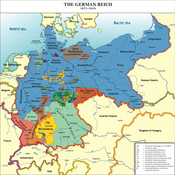States of the German Empire

The German Empire consisted of 25 constituent states and an imperial territory, the largest of which was Prussia. These states, or Staaten (or Bundesstaaten, i.e. federated states, a name derived from the previous North German Confederation; they became known as Länder during the Weimar Republic) each had votes in the Bundesrat, which gave them representation at a federal level.
Several of these states had gained sovereignty following the dissolution of the Holy Roman Empire. Others were created as sovereign states after the Congress of Vienna in 1815. Territories were not necessarily contiguous, such as Bavaria, or Oldenburg—many existed in several parts (enclaves and exclaves), as a result of historical acquisitions, or, in several cases, divisions of the ruling family trees.
Kingdoms
[edit]
- Kingdom of Bavaria
- Kingdom of Prussia (itself subdivided into provinces; including the Duchy of Saxe-Lauenburg ruled in personal union until annexed 1 July 1876)
- Kingdom of Saxony
- Kingdom of Württemberg
Grand Duchies
[edit]- Grand Duchy of Baden
- Grand Duchy of Hesse
- Grand Duchy of Mecklenburg-Schwerin
- Grand Duchy of Mecklenburg-Strelitz
- Grand Duchy of Oldenburg
- Grand Duchy of Saxe-Weimar-Eisenach (officially the Grand Duchy of Saxony from 1903)
Duchies
[edit]
- Duchy of Anhalt
- Duchy of Brunswick
- Duchy of Saxe-Altenburg
- Duchy of Saxe-Coburg and Gotha
- Duchy of Saxe-Lauenburg (till 1876)
- Duchy of Saxe-Meiningen
Principalities
[edit]- Principality of Lippe
- Principality of Reuss-Gera (Junior Line)
- Principality of Reuss-Greiz (Senior Line)
- Principality of Schaumburg-Lippe
- Principality of Schwarzburg-Rudolstadt
- Principality of Schwarzburg-Sondershausen
- Principality of Waldeck and Pyrmont
Free and Hanseatic Cities
[edit]Different from the above-mentioned monarchies these city-states were constitutionally organised as republics.
Imperial Territory
[edit]Different from all other aforementioned constituent states, this region, comprising territory ceded by France in 1871 after the Franco-Prussian War, was first administered directly by the central government, but was granted limited autonomy in 1911 with an elected state parliament of its own.

